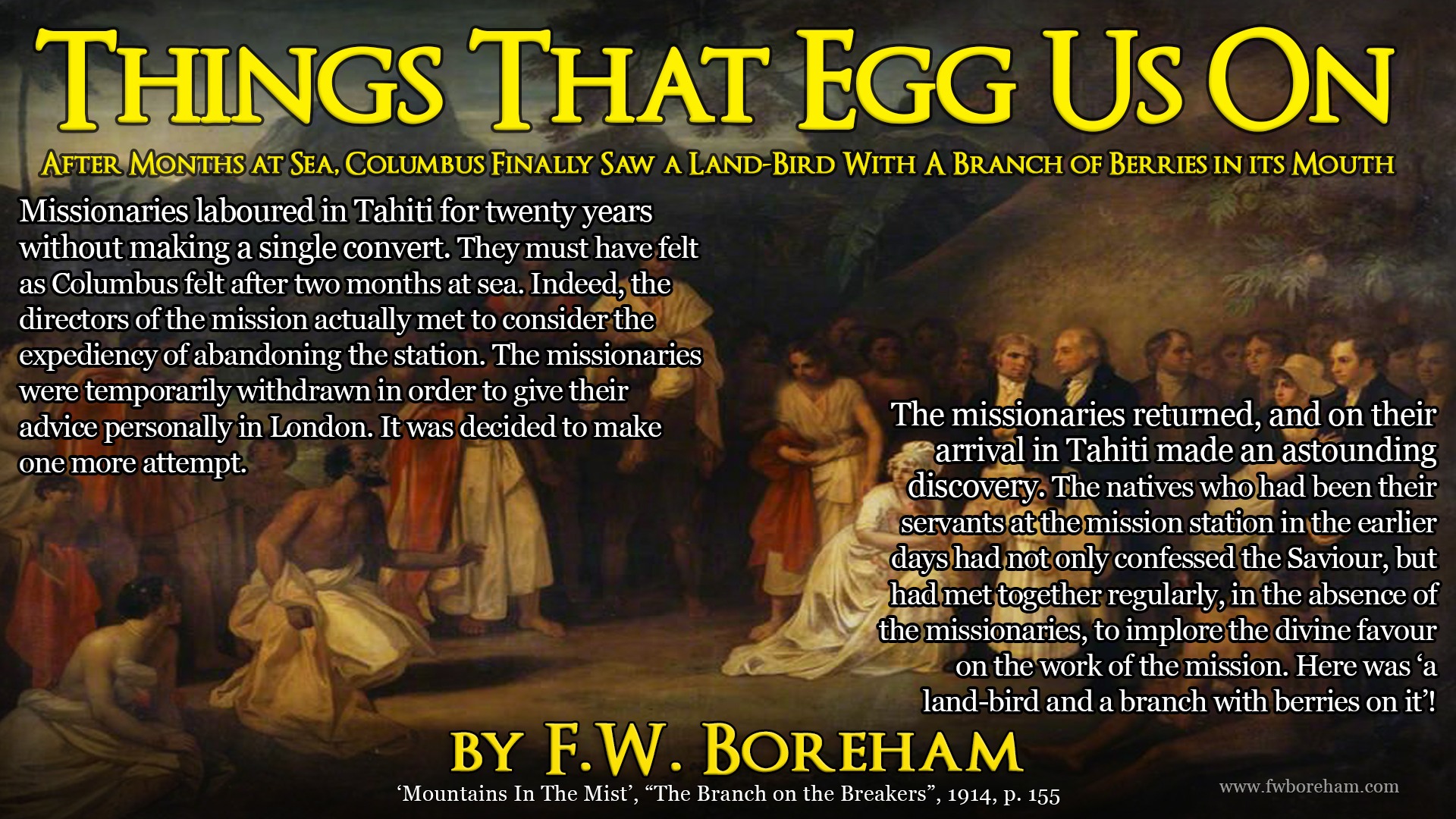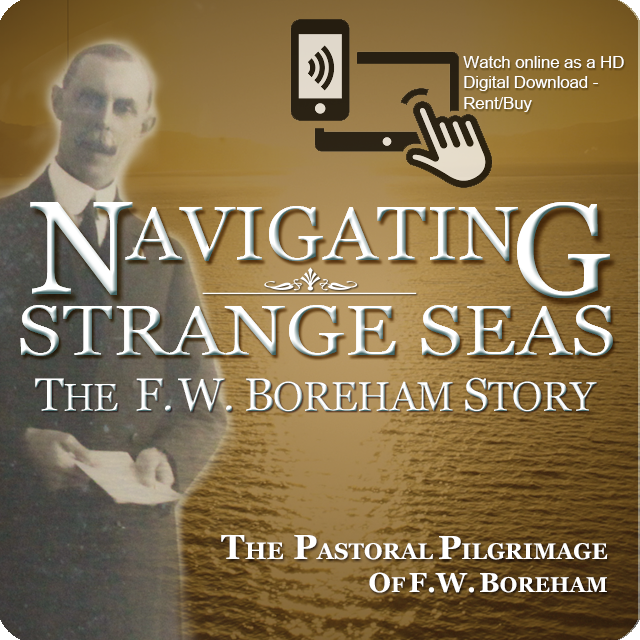home > books by FWB > 1914 Mountains in the Mist > THE BRANCH ON THE BREAKERS
That was a great moment in the history of this little world. We all remember vividly the drawn-out agony of those dreadful days, and still more dreadful nights, through which Columbus held his way across the unknown western seas. All on board believed the land of their search to be a wild freak of their commander’s disordered fancy.
They sailed and sailed, as winds might blow,
Until at last the blanched mate said:
‘Why, now not even God would know
Should I and all my men fall dead.
These very winds forget their way,
For God from these dread seas is gone.
Now speak, brave admiral, speak and say—’
He said: ‘Sail on! Sail on! and on!’
Two long months at sea! They believed that they had sailed beyond the reach of man and beyond the care of God. They made Columbus promise that, unless in three more days they sighted land, he would turn his prow once more to the east. And then, on on that third day, they saw, circling round the masts, a land-bird, and, tossing on the waves, a branch with berries on it!
Those who have travelled know something of the sensation. I remember once spending nearly three weeks at sea without sighting so much as a sail. We knew that we were approaching Cape Horn. And, on a memorable Sunday morning, bitterly cold, but brilliantly sunny, a pure white pigeon made its appearance, and flew about the ship. It is a funny thing to look back upon; the rails all round the decks black with hundreds of men and women, clambering and craning and straining, their faces flushed with excitement, all of them hungry to feast their eyes on this first harbinger of land: ‘a land-bird and a branch with berries on it.’
Who can forget the pathos of that scene, in Uncle Tom’s Cabin, when poor Eliza was escaping with her child from slavery? The bloodhounds were on her track. She must make all the pace she can, yet the toddling feet of her babe were terribly tired. But with womanly foresight ‘she had provided in her little bundle a store of cakes and apples, which she used as expedients for quickening the speed of the child, rolling the apple some yards before him, when the boy would run with all his might after it; and this ruse, often repeated, carried them over many a half-mile.’ Wise negro woman! Her cakes and apples were like the land-bird and the berries; they lured the traveller on. They remind us of a quaint old Grecian legend. One there was, or so the story goes, who, cherishing an ardent affection for the young, secreted himself in ambush on the road that led to the temple. Whenever he saw a tired child loiter on the sacred path, he would roll a golden ball in front of the halting youth, and, making him forget his fatigue, set his feet hastening once more towards the solemn fane.
Now, life is full of such things as the cakes and apples from Eliza’s basket, as the golden ball on the road to the temple; full, that is to say, of things that egg us on; full of land-birds and of branches with berries on them. One can easily imagine how the passionate enthusiasm of Columbus, which had led him to tramp across Europe begging for ships, and which had died down, like a fire burning itself out, during those long and fruitless weeks at sea, blazed grandly up again when the land-bird lighted on the rigging, and the berries tossed temptingly upon the waves. And exactly the same beautiful and cheering experience occasionally greets us all. I saw some boys engaging in a paper-chase. They were the hounds, and they had lost the scent of the hares. They had come a long way, and were exhausted. After a perfunctory search for the lost trail, they gave it up, and resolved to go home along the road. But just at that moment a straggler of the pack caught sight of a fluttering tassel of paper on the hillside, and, with a shout and a bound, they were off again in hot pursuit. It was ‘a land-bird and a branch with berries on it.’ How frequently have we trudged along the dusty and interminable road until, footsore and dispirited, we have paused and leaned for a moment upon a milestone or a stile! Was it really worth while going on? Had we not better turn back? And, even as we halted, we have caught sight, away on the slopes of a distant hill, of the first twinkling lights of the city that we sought. It was like ‘a land-bird and a branch with berries on it.’ We forgot our weariness, and forgave the long, long road behind. It was immediately after the pilgrims had been depressed and discouraged by their painful imprisonment in Doubting Castle that they saw, from the heights of the Delectable Mountains, the glory of the Celestial City. That first clear vision lured them on. It was ‘a land-bird and a branch with berries on it.’
I have just been reading Mr. Campbell N. Moody’s Saints in Formosa. Mr. Moody has a most interesting and suggestive chapter on ‘Loiterers.’ He shows how an idolater will come for treatment to the mission hospital, or stand, it may be, time after time, listening to the voice of the preacher. Nothing comes of it. The patient returns to his country home, and resumes his idolatry, as though nothing had happened. The casual hearer goes on his way, and seems to have received no very deep impression. But Mr. Moody shows that things are not what they seem. He gives some very striking cases which prove that away in his country home, and even at his degrading altars, the patient is haunted through the years by the memory of the teaching he received at the hospital. And, many years afterwards, a very small incident — the arrival of another preacher, or a chance meeting with a Chinese convert, or even the sight of a Christian church building — will bring the earlier impression to actual fruition, and lead the loiterer into the light of the gospel. That small incident, precipitating a crisis, is ‘a land-bird and a branch with berries on it.’
What does all our preaching and teaching amount to but to pointing out to disheartened mariners ‘a land-bird and a branch with berries on it’? All our definitions, and explanations, and expositions, and Christian evidences, they are but crepuscular intimations after all. We never actually point out the land. Dr. J. H. Jowett, of New York, put it very finely the other day. ‘Some minister of the Cross,’ he said, ‘toiling in great loneliness, among a scattered and primitive people, and on the very fringe of dark primaeval forests, sent me a little sample of his vast and wealthy environment. It was a bright and gaily coloured wing of a native bird. The colour and life of trackless leagues sampled within the confines of an envelope! And, when we have made a compact little phrase to enshrine the secret of Grace, I feel that, however fair and radiant it may be, we have only got a wing of a native bird, and bewildering stretches of wealth are untouched and unrevealed. No, we cannot define it.’ We have seen but ‘a land-bird and a branch with berries on it.’

Or look along another line. Missionaries laboured in Tahiti for twenty years without making a single convert. They must have felt as Columbus felt after two months at sea. Indeed, the directors of the mission actually met to consider the expediency of abandoning the station. The missionaries were temporarily withdrawn in order to give their advice personally in London. It was decided to make one more attempt. The missionaries returned, and on their arrival in Tahiti made an astounding discovery. The natives who had been their servants at the mission station in the earlier days had not only confessed the Saviour, but had met together regularly, in the absence of the missionaries, to implore the divine favour on the work of the mission. Here was ‘a land-bird and a branch with berries on it’! The discouraged workers renewed their toil with radiant faces, with what amazing result the world very well knows.
The case of the Lone Star Mission is very similar. For thirty-six years Mr. Day and his helpers had laboured there in Southern India with little or no result. At the American Baptist Annual Meetings in 1853, the delegates had to determine as to whether the work should be continued or abandoned. In that crisis a light broke upon the soul of an eminent hymn-writer, Dr. S. F. Smith, the author of ‘My Country, ’tis of thee.’ He heard the debate, and was filled with concern. He returned to his lodgings, and penned the familiar lines beginning:
Shine on, lone star ! Thy radiance bright
Shall spread o’er all the eastern sky ;
Morn breaks apace from gloom and night,
Shine on, and bless the pilgrim’s eye!
Next morning he read the poem to the Assembly.
The effect was electric. It was resolved to continue
the work, and the church that resulted enfolded thousands of converts within its membership. Dr Smith’s inspiration was ‘a land-bird and a branch with berries on it.’
I know a Sunday-school teacher. She had taken her class with conscientious regularity and admirable fidelity for years. But nothing came of it. She handed her resignation to the superintendent. As she left the building after doing so, one of her boys stopped her. Would she mind telling him just what it meant to join the Church? She went back and asked the superintendent for her letter. She tore it up unopened. She had seen ‘a land-bird and a branch with berries on it.’
I say again that the experience is a very common one. It comes to us, for example, whenever we kneel to pray. God is so great ; heaven is so high ; how may I know that my heartbroken cry shall be heard of Him? ‘Be comforted,’ says Pascal; ‘thou wouldst not be seeking Him if thou hadst not already found Him!’ The very inclination and desire to pray are from Him, They represent ‘a land-bird and a branch with berries on it.’
Two great and beautiful scriptures occur to me as I lay down my pen. ‘Ye were sealed with the Holy Spirit, that Spirit being a pledge and foretaste —an earnest— of our inheritance in anticipation of its full redemption.’ And this: ‘They had not received the promised blessings, but had seen them from a distance, and had greeted them, and had acknowledged themselves to be foreigners and strangers.’ The New Testament writers combine to assure us that all that we have received of grace and mercy and spiritual favour is but a foretaste and a pledge of the good land before us. It is ‘a land-bird and a branch with berries on it.’ ‘The patriarchs,’ says Delitzsch, ‘greeted the fulfilment of the promises from afar, as the wanderer greets his home, even when he only catches a glimpse of it in the distance.’ We are reminded of Cowper’s
….savage rock,
That hides the sea-mew in its hollow clefts
Above the reach of man. Its hoary head,
Conspicuous many a league, the mariner,
Bound homeward, and in hope already there,
Greets with three cheers exulting.
Courage, then! The country of our quest is not so doubtful as we think. The air is flecked with the snowy pinions of the land-birds, and the waves are strewn with branches having berries on them.
F.W. Boreham



















![Navigating Strange Seas, Part 1, "ENGLAND" Navigating Strange Seas, Part 1, "ENGLAND" - Available to watch online as a rental or to buy digitally or as a DVD [more]](https://www.fwboreham.com/wp-content/uploads/2019/01/fwb-digital-download-part01.png)
![NAVIGATING STRANGE SEAS, Part 2 - "NEW ZEALAND" - Available to watch online as a rental or to buy digitally or as a DVD [more] NAVIGATING STRANGE SEAS, Part 2 - "NEW ZEALAND" - Available to watch online as a rental or to buy digitally or as a DVD [more]](https://www.fwboreham.com/wp-content/uploads/2019/01/fwb-digital-download-part02.png)
![NAVIGATING STRANGE SEAS, Part 3 - "HOBART" - Available to watch online as a rental or to buy digitally or as a DVD [more] NAVIGATING STRANGE SEAS, Part 3 - "HOBART" - Available to watch online as a rental or to buy digitally or as a DVD [more]](https://www.fwboreham.com/wp-content/uploads/2019/01/fwb-digital-download-part03.png)
![NAVIGATING STRANGE SEAS, Part 4 - "MELBOURNE" - Available to watch online as a rental or to buy digitally or as a DVD [more]](https://www.fwboreham.com/wp-content/uploads/2019/01/fwb-digital-download-part04.png)